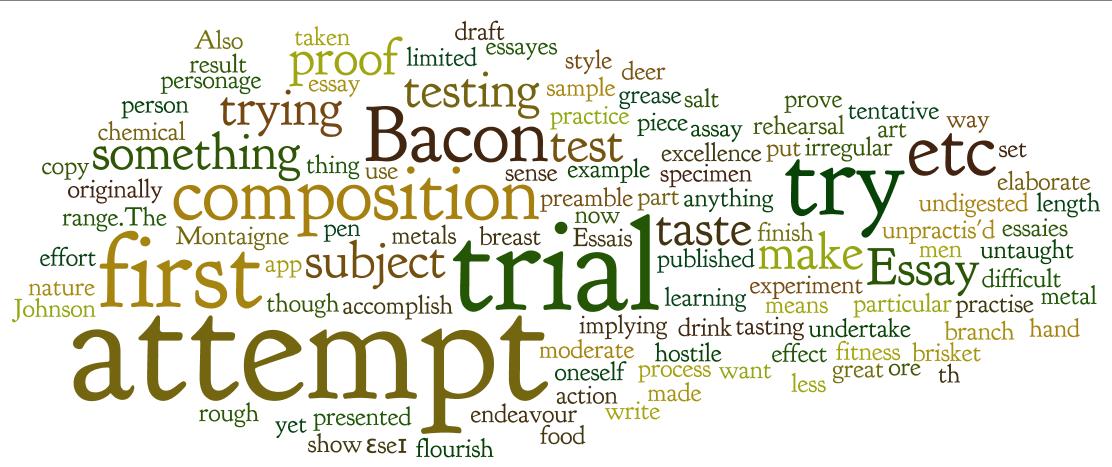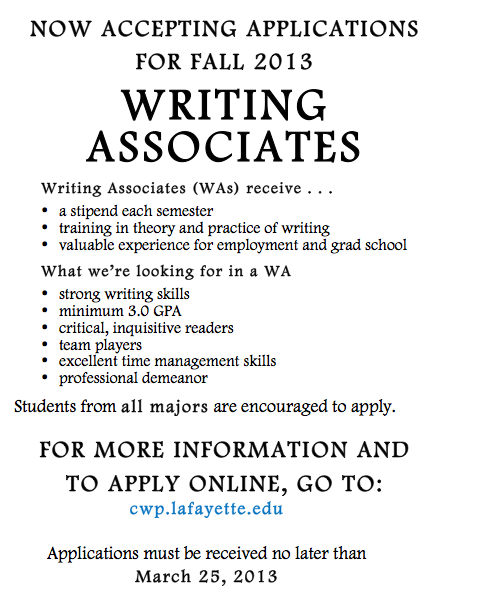Page 2 of 4
ENG 250. Writing Genres: The Essay 2.0
An exploration of the essay genre in the digital age. What is an essay? How has it been defined at different historical moments? What possibilities and opportunities for essay writing are emerging in the digital environments currently available to us as 21st-century writers? We’ll read a range of essays from early to contemporary examples of the genre. Writing projects will include a podcast and a digital essay on topics chosen by students, as well as shorter assignments responding to the reading and our class discussion.
 Brought to you by students in The Dog Course (VAST 248). Annual doggy social for campus canines and their humans on Tuesday, May 7, 11-1 PM on the Quad.
Brought to you by students in The Dog Course (VAST 248). Annual doggy social for campus canines and their humans on Tuesday, May 7, 11-1 PM on the Quad.
- 11-11:30 Free dog biscuits!
- 11:30-12:30 Play games & win prizes!
- 12:30-1 Meet the dogs!
To schedule an appointment, visit:
Both of my courses (ENG 218, V248-02) are full. Because they are writing-intensive, I am obligated to keep the enrollment at 20. If spaces open up, I will be happy to add you to the course, but happiest about doing that during the first week. Check Banner to see whether there are openings, and bring your add/drop slip with you to class.
The meeting time for English 110, section 5 is incorrectly given on the English Department website. Class meets on MWF from 2:10-3. Course topic is “Writing (and Reading) in the 21st Century”:
A recent study of writing by undergraduate students at Stanford University concluded that Stanford students are spending more time than ever writing (and reading). Nonetheless, concerns about how digital technologies like text messaging are eroding literacy skills—especially the literacy skills of students–are ubiquitous. So what does it mean to read and write well in the twenty-first century? What consequences has the digital “revolution” had for writing and reading? What has your experience been as a reader and writer in this digital age? How have digital technologies mattered to practices and conventions of academic writing? How do digital technologies figure into the other reading and writing that you do on a daily basis? The readings for this course will explore these questions and others about what it means to be a writer and reader in the 21st century. You will also be asked to bring these ideas to bear on your own experience, and to do so in a range of print and digital genres.
Add/Drops for all sections of ENG 110 are handled by our Department Secretary Mrs. Riefehstahl in Pardee 316.
CWP is now accepting applications for WA positions. Visit http://cwp.lafayette.edu/2011/02/17/online-wa-application/ for more information. The deadline for applications is Friday, March 11.
WORKING WITH SOURCES IN THE HUMANITIES
An informal workshop for students.
Tuesday, October 26, noon-1
Watt Writing Rm. (P 319)
Space is limited. RSVP by Sunday Oct 24.
Email cwp@lafayette.edu for more info.
Visit our Facebook page.
Co-sponsored by The College Writing Program and Skillman Library.
The College Writing Program has created an online gallery for collecting and exhibiting examples of “everyday” writing by members of the Lafayette community. For details about how you can participate, visit the CWP site.

